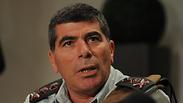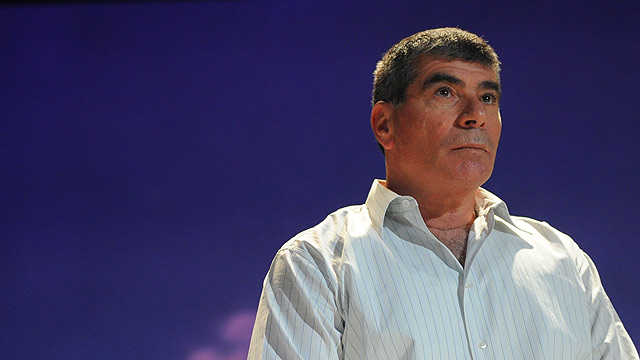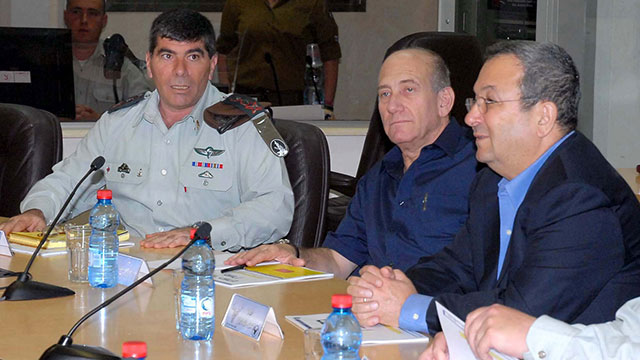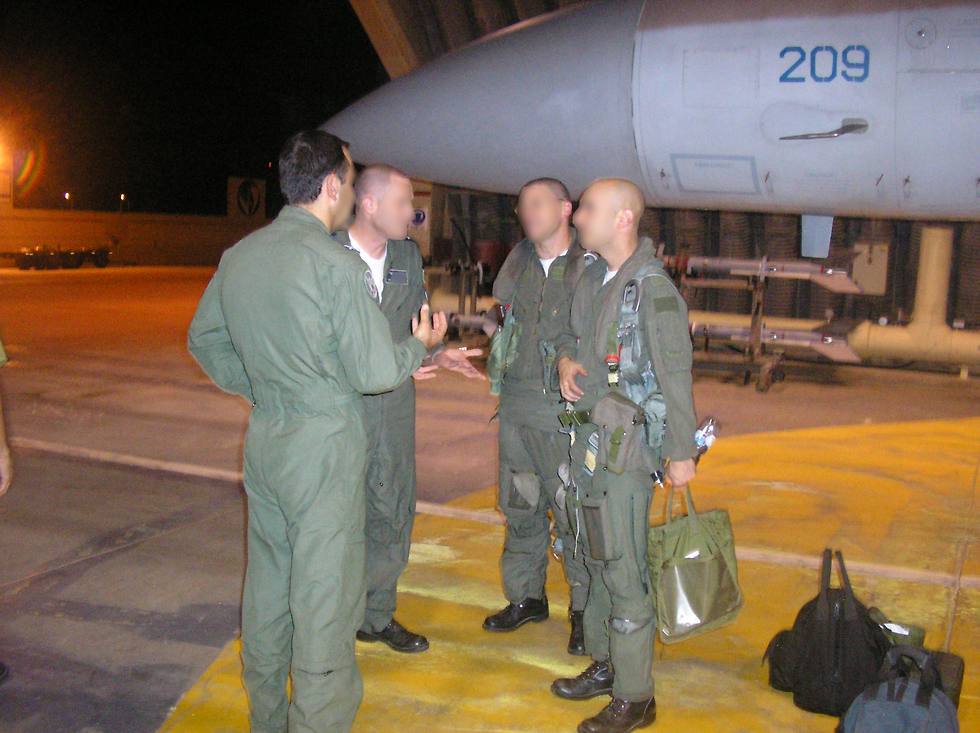
Ashkenazi: After reactor bombing, I hoped Israel wouldn't wake up to sirens
Former IDF chief of staff explains planning stages of IAF's rapid destruction of Syria's nuclear reactor, and how the war-weary IDF, fresh out of Lebanon, was banking on no response from Assad.
He had scarcely settled into his new seat at the IDF headquarters before he was hit with an intelligence bombshell: Syria was in the midst of building a nuclear reactor.
Speaking in an interview with Ynet, Ashkenazi explains how he integrated the Sisyphean task of rehabilitating the IDF with Operation Orchard, which almost brought Israel to the brink of war it was banking on preventing.
“Syria with a nuclear weapon is something that Israel cannot live with. I placed this issue as a first and top priority for the IDF. It was obvious that we needed to kill this reactor without an escalation to war, but if there was a war, we had to be able to win it," he said.
“It is an extremely complex challenge. At the beginning of 2007, after the Second Lebanon War, the IDF was facing deficiencies that were discovered in the war, flaws that had to be fixed and operational fitness that had to be repaired. Even equipment, part of our ammunition we had to quickly obtain from all kinds of places, and we needed to prepare the front which was vulnerable to an attack. In short, it was a task.
“We realized that we could set the stage before the reactor went live. We made a series of preparations. We also told the army stories about some sort of tension toward the summer in northern Lebanon. We entered an accelerated program for closing the gaps. We established units, the Hermon Brigade and others, and accelerated training."
Was everything done for the reactor?
"No. We had to do it anyway, The Second Lebanon War…"
So it served as a catalyst?
“Absolutely. It was a catalyst for what we should have done anyway.”
Interviews: Attila Somfalvi, Yoav Zitun, Ron Ben-Yishai; Content editor: Noam Gil; Director: Assaf Cuzin; Camera: Yaron Sharon, Ori Davidovitch, Yogev Attias; Script, video editing, animation: Tamar Avraham; Production: Adi Berman; Content management: Noa Glickstein Keren.
What about Defense Minister Ehud Barak saying ‘it can wait’?
“I don’t want to get into that argument. What took place in the discussions rooms and the cabinet should stay there. There were different opinions. At the end of the day the legal body, that is authorized to take a decision about going to war, it she Security-Cabinet. We gave them all the alternatives, people voiced their opinions and there were those who even voted against it. In the end, I think there was only one who opposed it and the cabinet accepted our recommendation.”
Was there tension with the political echelons? Barak didn't always see eye to eye with you.
“The defense minister had other opinions, but in the end, when it came to the day of decision, the defense minister accepted the army’s recommendation. He had all kinds of opinions and there were also arguments on the way, but I will say again, it’s worth keeping that in those rooms.”
The operation took place during the first week of September 2007. Less than two days before the planes took off, the IAF had conducted a simulated exercise for the mission, which would likely raise the need for improvements, but it was an external body that ultimately shuffled Israel’s cards and expedited the attack.
“At the time when we were in the exercise, questions started coming in from the international media about them knowing about the nuclear project and what is Israel doing about it. The secrecy was so important for us, so we asked the defense minister to convene the cabinet. There, I suggested two options at our disposal and asked the cabinet to leave it to us to decide on the day. I asked for approval, I suggested attacking and I insisted that we be able to decide the exact timing and the method of the mission.”
But did you actually know you were going to strike the same night?
“I still didn’t know. I thought that we were right on the cusp of taking action. The cabinet, in practice, authorizes the trio (Prime Minister Ehud Olmert, Defense Minister Ehud Barak and Foreign Minister Tzipi Livni) to decide on the timing, on the method and on the selection of the options. The trio convened and I recommended acting the same evening. They asked us if we were ready, I told them my recommendation and said we were. The previous evening I was presented with a model and I thought the air force had reached an extremely high operational level.”
What were your concerns?
“I didn’t want to risk being exposed. The intelligence picture was that the Syrians didn’t know that we realized what they were up to. We went back to the general staff, to the commander of the air force and got the people ready. I spoke to the pilots.”
Did you think the country might awaken to air raid sirens?
“You can never be sure, but I thought there was a chance. As the time approached for the mission’s execution, we carried out a series of actions in a way that wouldn’t sabotage the preparations. It wasn’t by coincidence that we trained units in the Golan Heights, it was no coincidence that there was a drill. I don’t want to elaborate on all of the details, but in fact we were sufficiently ready for another option.
“I thought that if we manage pull this off discreetly in a way that would not force Assad to react, there was a chance that he would enter what we called the ‘space of denial’. He would tell his people another story. That was based on the fact that few in Syria even knew about the reactor.”
Ashkenazi said he always had faith in the pilots’ abilities to hit the target, but that the main challenge lay in preventing a war.
“After the pilots had landed, I went up to the 14th floor of the Kirya IDF headquarters, looked out of the window at Tel Aviv that was sleeping and said I hope we don’t have to wake the residents unnaturally. It took a few hours before we began to realize how the other side would respond to what had happened to it.”
Despite the achievement, Ashkenazi admitted that the operation did not contain the same complexities that faced the IAF during the 1981 Operation Opera to obliterate Iraq’s Osirak nuclear reactor.
“The operation was comparatively shorter than other similar ones. Ever from a comparative point of view to the attack in Iraq in 1981, it wasn’t the same challenge. In Iraq it was a longer flight, a longer distance, a lower altitude all the time, it was entering into the city with anti-aircraft batteries. It wasn’t simple.
“In this case, we had the confidence that the pilots would carry it out. It was a comparatively shorter flight distance, a few kilometers, but from the moment you cross the border it is comparatively shorter.”
Were Syrian anti-aircraft batteries locked onto the planes?
“I don’t want to get into that. In my opinion, to this day, the Syrians don’t understand how the Israeli Air Force carried out the plan. There’s no need to elaborate because some of the things are still relevant.”
What would have happened if the reactor had remained?
“The answer is very clear. We wouldn’t want Syria or ISIS, which occupied the area, to have nuclear capabilities. It’s a waste of words to say this. There would have been a disaster if it had fallen into their hands.
“I think there is a lesson to be learned here,” Ashkenazi concluded. “Even in countries that are in close proximity, the enemy can decide to undertake a project that few in his country know about. We need to understand that this can happen. We don’t always see everything.”
Does that apply to Iran today?
“Absolutely.”














